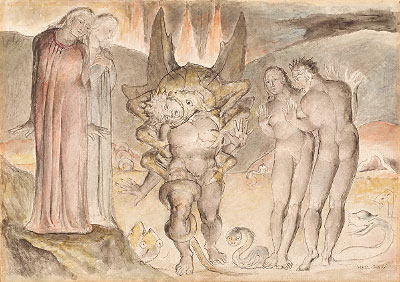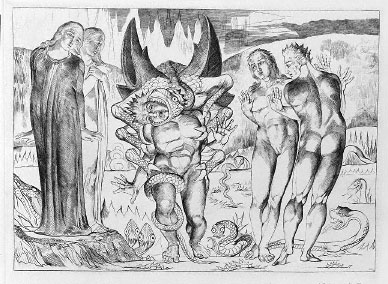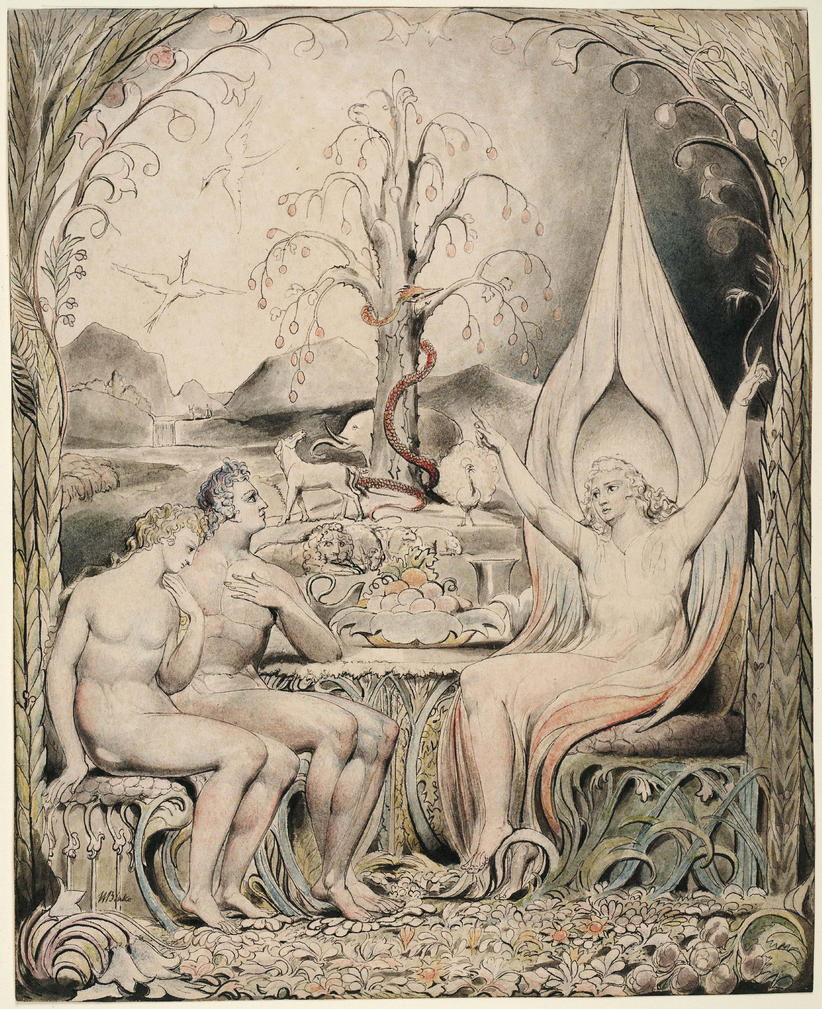 |
Wikipedia Commons The Soldiers Casting Lots for Christ's Garments |
From Ram Horn'd with Gold with added image and quotes.
The
Neo-platonic interpreters have theorized that Blake couldn't forgive
the creator for condemning us to this prison house of mortal life. I
think a more universal explanation fits the facts. Everyone has
difficulty forgiving his father and/or creator for the dimensions of
horror in life which threaten in one way or another to overwhelm the
psyche. Few or none of us have done a really adequate job of this. Most
often we've repressed the sensitive idealist; we've closed off from
consciousness those unpleasant ultimate realities which seem to have no
answer.
"Did he who made the Lamb make thee?" Has anyone
really asked that question since 1794? Neitszche asked it and went
crazy. In our generation Jung has come closest, and that's what makes
him great. Most of us, even the best of Christians, have partitioned off
and closed out that ultimate question, the ultimate doubt expressed by
the dying Saviour on the cross. This William Blake could not do; like
Jesus he was condemned to face consciously the penalty of our finitude.
Psalms 22
[1] My God, my God, why hast thou forsaken me? why art thou so far from helping me, and from the words of my roaring?
Matthew 27
[46] And about the ninth hour Jesus cried with a loud voice,
saying, Eli, Eli, lama sabachthani? that is to say, My God, my God, why
hast thou forsaken me?
Frye
has spoken of the 'abyss of consciousness'. Enion, the primeval mother
in 4Z is condemned to it by her love of her children. At the end of
Night II she calls our attention to this blindness which we have chosen
and its opposite, the abyss of consciousness which she (and Blake in
her) is condemned to face; here is her complaint.
Four Zoas, Night II, Page 35, (E 325)
"What is the price of Experience do men buy it for a song
Or wisdom for a dance in the street? No it is bought with the price
Of all that a man hath his house his wife his children
Wisdom is sold in the desolate market where none come to buy
And in the witherd field where the farmer plows for bread in vain
It is an easy thing to triumph in the summers sun
And in the vintage & to sing on the waggon loaded with corn
It is an easy thing to talk of patience to the afflicted
To speak the laws of prudence to the houseless wanderer
Page 36
To listen to the hungry ravens cry in wintry season
When the red blood is filld with wine & with the marrow of lambs
It is an easy thing to laugh at wrathful elements
To hear the dog howl at the wintry door, the ox in the slaughter house moan
To see a god on every wind & a blessing on every blast
To hear sounds of love in the thunder storm that destroys our enemies house
To rejoice in the blight that covers his field, & the sickness that cuts off his children
While our olive & vine sing & laugh round our door & our children bring fruits & flowers
Then the groan & the dolor are quite forgotten & the slave grinding at the mill
And the captive in chains & the poor in the prison, & the soldier in the field
When the shatterd bone hath laid him groaning among the happier dead
It is an easy thing to rejoice in the tents of prosperity
Thus could I sing & thus rejoice, but it is not so with me!"
Something
is terribly wrong in this created universe, and in the face of this
underlying wrongness the idea of a loving Father as Creator simply
doesn't fit all the facts. This consciousness, which Blake shared with
Dostoevski in the person of Ivan Karamazov, interrupted Blake's
childlike innocence and precipitated the torturous journey "through the
Aerial Void and all the Churches".
Fyodor Dostoyevsky,
The Brothers Karamazov
“Look, suppose that there was one among all those who desire nothing but
material and filthy lucre, that one, at least, is like my old
Inquisitor, who himself ate roots in the desert and raved, overcoming
his flesh, in order to make himself free and perfect, but who still
loved mankind all his life, and suddenly opened his eyes and he saw that
there is no great moral blessedness in achieving perfection of the will
only to become convinced, at the same time, that millions of the rest
of God's creatures have been set up only for mockery, that they will
never be strong enough to manage their freedom, that from such pitiful
rebels will never come giants to complete the tower, that it was not for
such geese that the great idealist dreamt his dream of harmony.”
Milton, Plate 35 [39],(E 136)
"Just in this Moment when the morning odours rise abroad
And first from the Wild Thyme, stands a Fountain in a rock
Of crystal flowing into two Streams, one flows thro Golgonooza
And thro Beulah to Eden beneath Los's western Wall
The other flows thro the Aerial Void & all the Churches
Meeting again in Golgonooza beyond Satans Seat"
Probably a majority of people will always refuse such an invitation;
they will cling to the refuge of their Church, or Bible, or President,
or fraternity, or whatever form of authority they have made their
obeisance to, whatever they have found to block out the abyss of
consciousness. A few will have at least a sympathetic or vicarious
interest in the problem posed by Blake and Dostoevski. A handful will
perceive that to realize their full humanity and the God Within they
must proceed beyond innocence. They, too, must take that long journey
and plumb life to its wholeness. The art of Blake offers a good map for
the trip.
Songs and Ballads (E 476)
"My Spectre around me night & day
Like a Wild beast guards my way
My Emanation far within
Weeps incessantly for my Sin
...
& Throughout all Eternity
I forgive you you forgive me
As our dear Redeemer said
This the Wine & this the Bread"






_object_45_The_Little_Vagabond.jpg)


